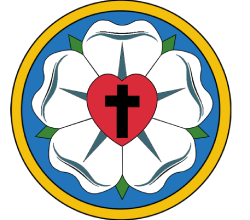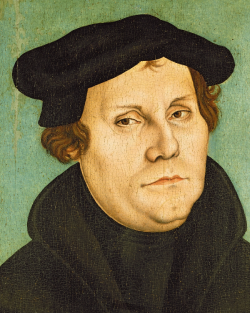
The newly-formed Terran Communion of Confessional Churches is the largest body grouping together the Confessional Churches of Terra. Confessionalism (OOC Lutheranism) is a branch of Abjurant (OOC Protestant) Hosianism, and is considered the oldest Abjurant faith. It has members throughout Terra, and some of the largest Abjurant Churches either wholly or in part subscribe to Confessionalism. In spite of their doctrinal agreement and shared history, these Churches have not been in communion with each other until the formation of the Terran Communion of Confessional Churches in 5333. Instead they have been in communion with other denominations. The Holy Luthori Church, considered the "mother" of Confessionalism and the first denomination to subscribe to Confessional doctrine, is part of the Luthori Communion that includes other Confessional Churches, usually in nations formerly colonized by Luthori, and is itself in communion with the theologically very distinct and non-Confessional Union of Nordland. On the other hand, the main Confessional Church in Dundorf, the Confessional Ameliorate Church of Dundorf, is an ecumenical body formed of both Confessional and Ameliorate (OOC Reformed) Hosians, and is in communion with Confessional Churches not part of the Luthori Communion as well as with several Ameliorate Churches. One very different Confessional Church is the Zagorite Church of Kundrati, because it is older than Confessionalism and the Abjuration and because it did not start as a Confessional Church. Founded a full century before the Abjuration, the Zagorite Church of Kundrati is a Zagorite (OOC Hussite) denomination that has, with time, joined the Abjuration and adopted Confessioanal doctrine. Due to its retention of the historic episcopate and apostolic succession, the Zagorite Church is a member of the Luthori Communion.
These differences in ecumenical relations is not the only obstacle that has prevented full communion between all of Terra's Confessional Churches until now. The issue of Church governance has been a significant and near insurmountable impediment to communion and dialogue. Whereas the Luthori Communion has an episcopal church structure and has maintained apostolic succession, most of the other Confessional Churches have a presbytarian polity, and are largely critical of what they see as a Patriarchal leftover in the Luthorian Churches. It should be noted however that the Confessional part of the Confessional Ameliorate Church of Dundorf also has an episcopal polity, and that a small minority of Ameliorate Churches call their supervisors Bishops, without however maintaining apostolic succession.
In spite of all these differences, Confessional Churches maintain the same doctrinal core and do not, with some significant exceptions, regard each other as heterodox. Because of this, and seeking to safeguard the status and influence of Confessionalism as a distinct branch of Abjurantism, the main Confessional Churches have formed the Terran Communion of Confessional Churches this year as an international communion in order to coordinate efforts and establish a common international framework for cooperation. The member Churches have established pulpit and altar fellowship with each other, without however abandoning the other communions each Church is a part of.
Overview of Confessionalism
History

John Martyn of Luthori, considered the founder of Confessionalism
The history of Confessionalism is indistinguishable from that of the Abjuration itself. It was founded in 1519 in Luthori with the so-called Abjuration of Erneburg, the publication of the 15 Articles of Abjuration by John Martyn and his followers whereby they renounced the authority of the Arch-Patriarch of the Holy Apostolic Hosian Church of Terra and established a distinct faith that would later be known as Confessionalism. John Martyn was a Dundorfian theologian and priest from Ikradon who caused controversy due to his preaching against an excessive focus on relic veneration. Though his sermons at first focused exclusively on the potential for idolatry and superstition that an excessive emphasis on relics could cause, he later began critiquing other aspects of the Church that he believed deviated from scriptural commands. Facing violent persecution in the Dundorfian Reich, John Martyn and his followers relocated to the religiously more tolerant Luthorian Empire. Following their excommunication by the Arch-Patriarch, they published the Fifteen Articles of Abjuration in 1519 in the Luthorian city of Erenburg (today's Erneborough). The Luthorian Empire was established in 1407 partly out of a desire to obtain the independence of the Luthorian Church from Auroria, and as such Luthori tolerated the emerging schism. At the Diet of Nordmünster (held in today's Northminster) the Luthorian Emperor demanded that John Martyn and his followers present a summary of their faith. The resulting Northminster Confession was well received by the Emperor, who approved the document and forced the entire Luthorian Church to adopt it as its official confession of faith. Confessionalism and the Holy Luthori Church were thus born.
Today Confessional Churches are distinguished by their adoption of the Northminster Confession, usually included in the larger Book of Creeds, a document containing all important creedal documents Confessionalists subscribe to, such as the Creed of the Hosioi, the Aurorian Creed, and the Northminster Confession. The document is also important in the history of Amelioratism, which takes its name from the "Ameliorate Northminster Confession", an updated version of the creed meant to bridge the gap between Confessionalism and the emerging Amelioratism, and which was signed by Gert van Tassel himself.
The Northminster Confession is ultimately the main bridge that unites all Confessional Churches. Those of the Luthori Communion, known as Luthoran or Luthorian Churches, consider themselves Aurorians of the Northminster Confession, believing it to be an orthodox Confession of Faith of the Aurorian Church and emphasizing its continuity with the Holy Apostolic Hosian Church of Terra. Those of the Dundorfian tradition on the other hand believe that with the Abjuration of Erneburg Confessionalism broke all ties to the Aurorian Church and that the maintenance several Aurorian practices preserved in Luthorianism is unscriptural and goes against Confessional doctrines. For this reason the two Confessional traditions have been in different communions until now. Luthorian Churches have established communion with other Churches with episcopal polity even though they did not subscribe to the Northminster Confession, while Dundorfian Confessionals have emphasized the Abjurant character of Confessionalism and have formed communions with the more radical Ameliorate Churches even though they too do not accept the Northminster Confession. The Terran Communion of Confessional Churches is the first time that most Churches following the Northminster Confession have established pulpit and altar fellowship with each other.
Beliefs
As their doctrinal core is based on the Northminster Confession, all Confessional Churches follow these basic beliefs:
1) Sovereignty of God: the belief that humans are incapable of being saved through their own efforts, no matter how meritorious. Only faith in God and His Spirit can bring salvation. God works through those who have faith so they produce good works as a result, but good works on their own are soteriologically useless.
2) Sovereign Grace: the belief that nobody deserves salvation, and that grace is freely given by God to the believer with no precondition.
3) Sovereign Word: the belief that the Word of God contained within the Hosian Scriptures is the sole infallible source of faith. Confessionals do not generally reject Church tradition, but they do not believe it to be infallible like the Scriptures.
In addition to these three beliefs, many, though not all Confessionals also profess a belief in the Northminster Confession itself because it agrees with Scripture, while others hold that the Confession is true insofar as it agrees with Scripture. This seemingly minor disagreement highlights a sharper doctrinal distinction between those who hold the Northminster Confession as an inspired work that does not contradict scripture and thus a source of doctrine, and those who allow for the possibility that the Confession may be in conflict with Scripture and consider only the latter to be a valid source of Hosian doctrine.
Besides the fundamentals of doctrine, there are also disagreements between Confessional Churches on matters of morality. Many Churches, particularly but not exclusively of the Luthori Communion, have accepted the ordination of women and have embraced LGBTQ+ rights, while other Confessional Churches remain conservative on this aspect. The Terran Communion of Confessional Churches does not address this disagreement and allows member Churches latitude in their internal beliefs and structure.
